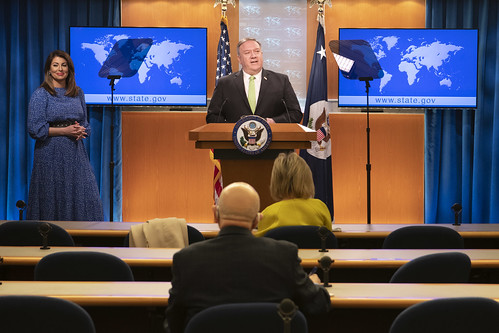"We, the freedom-loving nations of the world, must induce China to change, just as President Nixon wanted. We must induce China to change in more creative and assertive ways, because Beijing's actions threaten our people and our prosperity.
We must start by changing how our people and our partners perceive the Chinese Communist Party. We have to tell the truth. We can't treat this incarnation of China as a normal country, just like any other."
- Secretary of State Mike Pompeo
As Secretary of State Mike Pompeo continues to bloviate on a litany of sins that the Chinese government is guilty of, and various politicians and media outlets continue their nonstop propaganda about how evil Russia is, it is clear that the goals is to keep Americans perpetually indoctrinated with the idea that these two nations are incorrigible enemies.
This is consistent with the National Defense Strategy (NDS) of 2018, which states that the main threats facing the United States in the foreseeable future are Russia and China. And while the terminology of "great power competition" is thrown around, there is emphasis placed on the implicit clash of values with the U.S.-led west, with several references to the "free and open international order" that these two nations are putatively in violation of.
This shares some continuity with the Neoconservative-inspired Wolfowitz Doctrine of the early 1990's, which granted Washington the right to forcibly determine what values and political framework the rest of the world should adhere to while maintaining hegemony over the world. The Democratic Party has embraced similar foreign policy ideas. Even the "progressive" wing, represented by Bernie Sanders, touted a need to take on the world's "authoritarians" who were threatening the enlightened west.
All societies throughout modern history have had to prioritize various issues that impact national survival and their populations: the balance between the individual and the collective good, or the impact of change vs group instability, democracy versus economic development, etc. Different societies have resolved these issues in different ways, with varying results.
But the United States, with its triumphalist attitude at the close of the Cold War, decided that its way of life had been judged to be inevitable for everyone in the world. This was summed up in Francis Fukiyama's The End of History. Western, especially American, political values and norms have been assumed to be the only correct way to resolve the most basic questions of organized life, regardless of whether a country has had any meaningful experience with western values. If a country disagrees or chooses to prioritize differently, they have been deemed backward or illegitimate.
This leaves no space for pluralism, negotiation or peaceful co-existence. Instead, it leads to a world in which conflict is inevitable and differences are irreconcilable. Constant war and the threat of war, especially with the three most powerful players on the world stage - the U.S., China and Russia - having nuclear weapons arsenals at their disposal, makes this an immoral and unsustainable framework.
How societies choose to resolve the most basic questions of organized life will depend upon their geography, history, and culture - all of which shape their world views and, hence, what is most important to them and why. For example, Russia - lacking the natural barriers that the United States takes for granted - has been invaded numerous times in its history. These invasions included Napoleon in the 19th century and Germany twice in the 20th century. The second German invasion resulted in the deaths of 27 million Soviet citizens during WWII and the destruction of one third of the country. The expansion of the NATO alliance up to Russia's borders through the very corridors which Napoleon and Hitler came, despite the fact that no opposing alliance (the Warsaw Pact) exists, will inevitably be bitterly opposed by the Russians who value security highly.
Russians also have a history of being materially poorer than many of their western counterparts. During the Soviet era, the industrialization and provision of basic necessities such as education, housing and health care were considered a major advancement in comparison to the pre-Soviet reality of a country consisting of mostly poor and illiterate peasants toiling in the countryside. But compared to the post-war western world, led by the United States - which had emerged relatively unscathed and very prosperous - Soviet citizens lived an austere life with few frills or consumer goods. In the post-Soviet 1990s, the modest income and savings that most Russians had acquired disappeared as a handful of homegrown predators, aided by western "advisers" from elite U.S. universities, scooped up the country's assets at fire sale prices and sabotaged any efforts at developing a more equitable market system. Massive poverty resulted, along with an eruption of crime and the worst mortality crisis seen since WWII.
Consequently, Russians place a major priority on improving their economic conditions and standards of living The remarkable progress that had been made in this regard during most of the Putin era, in addition to the cushioning of the Russian economy during sanctions, goes a long way toward explaining Putin's approval ratings - still high, even after a recent drop, compared to some other western leaders. In short, Putin's priorities are Russians' priorities: security, stability and improving the economy. For many Russians, these issues are prioritized more highly than political democracy. But even political democracy has achieved some gains in the Putin era, despite the fact that you don't hear about them in western media.
Similarly, China's history has left an indelible impression on its leadership and its people. China was humiliated by western imperialism in the 19th century. This included Britain with respect to the Opium Wars in which they finally managed to force China to engage in trade in general and the sale of opium in particular, leading to massive drug use and the perceived sabotaging of independent Chinese development. After half a century of western control of its economic affairs and attempts to impose Christianity by missionaries, a group of Chinese citizens led an uprising in 1899, which became known as the Boxer Rebellion. The rebels began attacking foreigners and Chinese Christians. The attacks eventually spread to the foreign district of Beijing, including foreign-owned property and churches. Foreign diplomats and businessmen were besieged for weeks until a military force comprised of Western and Japanese powers put down the uprising.
As a result, China prioritizes independence and economic development on its own terms. For example, the Chinese government has not allowed most of its assets to be sold off to foreign bidders, much to the chagrin of U.S. elites. China has even less experience with political democracy than Russia. But the Chinese population appears to largely approve of their government's leadership.
There's a lot of irony in the fact that the American political class, which largely considers itself to be secular and above the religious superstitions of the commoners, still seeks to impose its ideology on the rest of the world as zealously as any missionary of the past.
Both Russia and China are countries on the other side of the world with different worldviews shaped by their own unique experiences. Their interests are not the same as our interests and that is actually quite natural. They can both rightly be classified as competitor nations. But competitors don't necessarily have to be enemies. The U.S. could successfully navigate problems with either or both of these countries with a return to creative and competent diplomacy.
(Note: You can view every article as one long page if you sign up as an Advocate Member, or higher).






